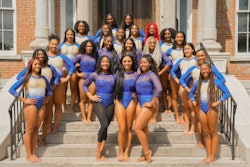Sports medicine used to be the sole responsibility of athletic trainers and team doctors, whose only emphasis was treating injured athletes.
While treating injuries is still a major focus, the field of sports medicine has grown to include a host of medical specialists who work collectively to provide total care for the athlete. In addition to the physicians and trainers, nutritionists, physiologists, physical therapists and psychologists are now an integral part of the team approach in sports medicine. And all careers in sports medicine require a college or post-graduate degree of some kind.
Degrees in sports medicine are not as hard to come by as they were ten to fifteen years ago. There are at least 130 colleges in the United States and Canada that offer four-year degrees in sports medicine. With so many options available, choosing a career path in sports medicine may not be so clear cut.
“You have to remember that there are a lot of levels of participation,” says Dr. Letha Y. “Etty” Griffin, an Atlanta orthopaedic surgeon. “A lot depends on what aspect of sports medicine you want to get involved in. And you have to ask yourself how much time and how much money you want to spend getting the education you need for what you want to do.”
Career opportunities for women and minorities are numerous, says Dr. Griffin, who also serves as team physician for Georgia State University and Agnes Scott College. “There are more women and minority trainers and physicians than five years ago,” she explains. “And now that more people are getting into fitness and recreational sports, the demand for trainers and physiologists has increased. “
The boom in recreational sports and physical fitness has broadened the horizon of sports medicine beyond high school, college and professional athletics. Sports-medicine clinics, fitness centers and health clubs have helped increase the demand for physicians, trainers, physiologists and other specialists.
Doctors are aware of the demand. Currently, there are approximately 3,800 physicians who belong to the American College of Sports Medicine — a 50 percent increase over the last decade. Approximately 1,100 of the top orthopaedic surgeons in the country are certified by the American Board of Orthopaedic Surgery — and most of those belong to the American Orthopaedic Society for Sports Medicine.
With all the requirements for specialized training in this field, coaches cannot be overlooked as part of the sports medicine team. Many coaches have advanced degrees and are knowledgeable about first aid and injury prevention. Lois Daigneault uses her background as a sports medicine major to enhance her coaching skills. Daigneault, who coached Canadian and Macedonian swimmers at the 1996 Summer Olympics in Atlanta, is excited about the results she’s seen in the swimmers she’s trained.
During training sessions, Daigneault films swimmers both above water and under water, paying close attention to the biomechanics of their swim strokes and helping them correct flawed techniques. She has also devised a weight training program that strengthens swimmers and helps keep them free of injury. “It’s like preventive maintenance,” says Daigneault. “The weight program really gets the job done. Knock on wood, I haven’t had an athlete with an injury yet.”
The overall outlook for career opportunities in sports medicine continues to be promising, says Dr. Clarence Shields, a L Los Angeles-based orthopaedic surgeon. However, he believes that there is an oversupply of orthopaedic surgeons being trained in sports medicine.
“Even with that, the field has so many layers to it,” says Shields, who was the team physician for the Los Angeles Rams for twenty-three years before the team moved to St. Louis. “My advice to someone interested in sports medicine as a career is to find a mentor. You can also spend some time in a physical therapy facility or look into opportunities as an athletic trainer. There are a lot of opportunities in those areas.”
RELATED ARTICLE:
Career Possibilities
Careers in sports medicine aren’t limited to pro teams, college teams, world-class athletes and high school sports. A heightened awareness of wellness and the rising participation levels in recreational sports have created a demand for people to enter the sports medicine field.
ATHLETIC TRAINER
In the sports medicine-mix, trainers are the first point of contact. Of all the people who are part of a sports medicine team, trainers are the most familiar with the athletes because they work with them on a daily basis. They decide which injuries require first aid and which need to be looked at by team doctors.
A four-year degree is needed to be a trainer with an emphasis on specific courses, but most have advanced degrees. It’s not unusual for trainers to also have a degree in physical therapy.
NUTRITIONIST
Determining the proper diet to enhance maximum performance has become increasingly important in the overall landscape of sports. In most cases, nutritionists serve athletic teams as consultants and lecturers. Practitioners usually have a bachelor’s degree in the food sciences.
PHYSIOLOGIST
These specialists, who study how the body responds to exercise, are also becoming major players in sports medicine. Research done by physiologists has been used to boost athletic performance while discovering ways to reduce the frequency of injuries. Those entering this field will have a bachelor’s degree in biology, the bio-mechanical sciences or physical education. Many opt to pursue post-graduate degrees.
PSYCHOLOGIST
This is still a developing specialty. At present, you’ll find most sports psychologist working in the prime-time arenas — pro sports, the Olympics and the major college programs. As more is discovered about the impact psychology can have on athletic performance, more colleges and perhaps some high schools will use the services of a psychologist. At the minimum, a four-year degree is required. But in this specialty, the academic progression continues to the master’s and then a Ph.D. degree in psychology.
PHYSICAL THERAPIST
Physiotherapists, as they are sometimes called, treat athletes in clinics or rehabilitation programs, helping the athletes to recover from various injuries or illnesses that can result in debilitating disabilities. Physical therapists must have a bachelor’s degree in that field or two to three years in an approved training program.
PHYSICIAN
Team doctors treat injuries and illnesses of the athletes. Most are either family-practice physicians or orthopaedic surgeons. Pro teams will enlist the services of the physician and surgeon. Colleges usually have one or more full-time team doctors on staff. At the middle school and high school level, team physicians are usually the school physicians appointed by the local school board. The physicians conduct physical exams and treat the less severe injuries.
They work in conjunction with the orthopaedic surgeons, who handle major surgeries on bones, joints, muscles, and legaments. Surgeons also supervise the rehabilitation of athletes after surgery. Team doctors and orthopaedic surgeons are required to have a bachelor’s degree plus four years of medical school and an M.D. or D.O. (doctor or orthopaedics) degree. All doctors will have a one-year internship and several years of residency training. The American Board of Family Practice mandates that doctors have three years of post-graduate training in order to be certified.
The American Board of Orthopaedic Surgery requires five years training after graduation from medical school with a minimum of three yeas in orthopaedic surgery. Physicians may also take a fellowship in sports medicine either during or after their prescribed orthopaedic training. For additional information about careers in sports medicine, contact the American Orthopaedic Society For Sports Medicine at 6300 N. River Road, Suite 200, Rosemont, III. 60018.
COPYRIGHT 1996 Cox, Matthews & Associates
© Copyright 2005 by DiverseEducation.com



















